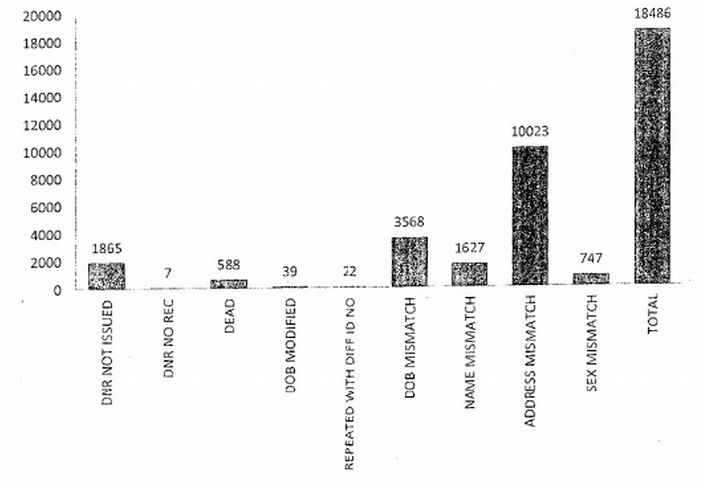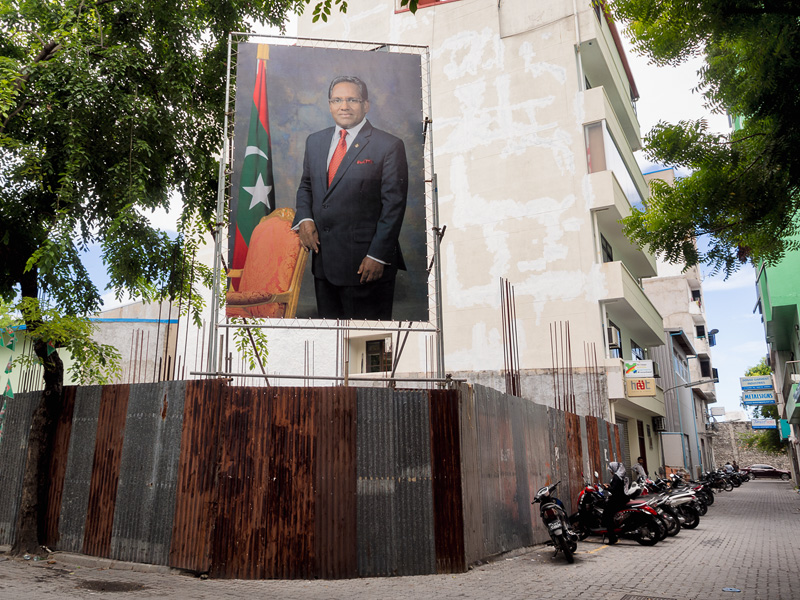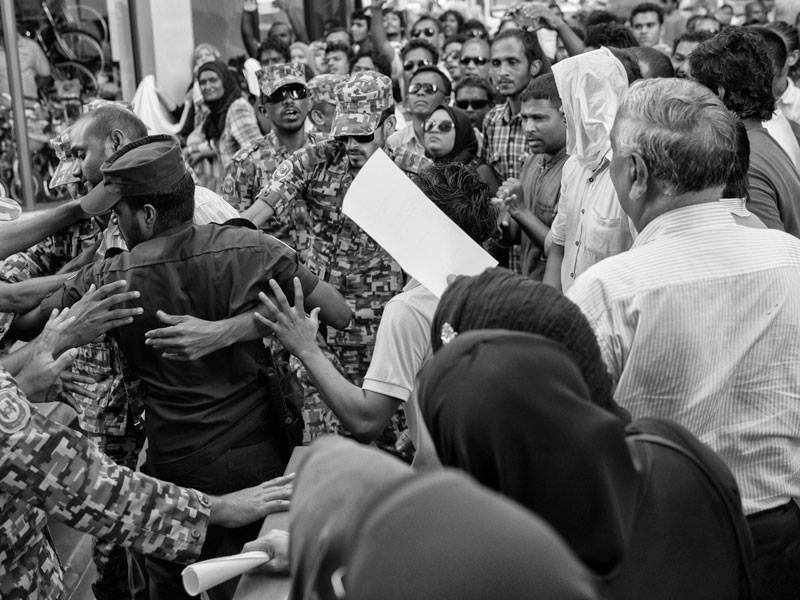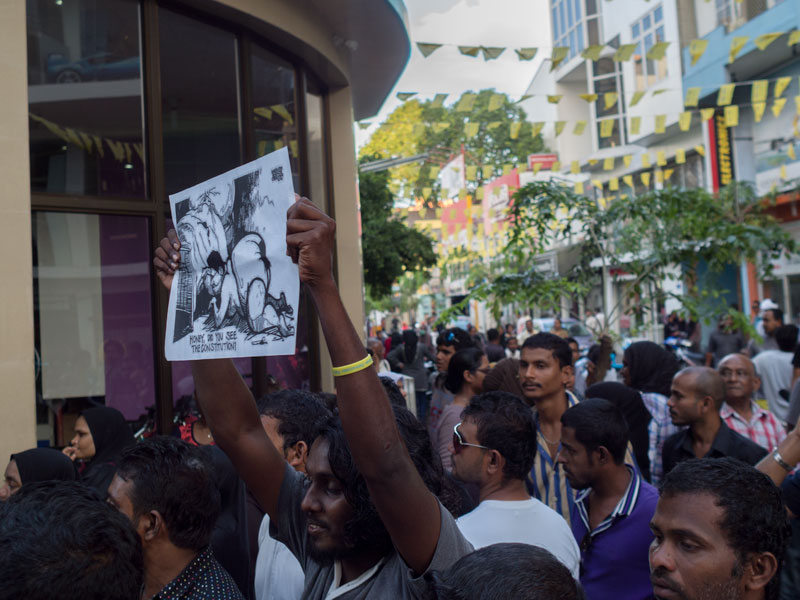This translation first appeared on Dhivehi Sitee. Republished with permission.
Shortly before midnight on 7 October 2013, four of the seven judges on the Maldives Supreme Court Bench put out a majority verdict annulling the first round of the 2013 Presidential Election held on 7 September 2013. The election was heralded as free, fair and largely free of errors by both local and international observers. The four judges ignored this consensus and, instead, chose to rely heavily on a ‘secret report’ compiled by a team of ‘forensic experts’ from the Maldives Police Service as the main evidence to support claims of Jumhooree Party, the complainant in the case. The report was so secret that it was not shared even with lawyers of the defendant, the Elections Commission, depriving them of the essential undeniable right of reply.
The following is a translation of another secret report the so-called expert forensic team compiled on 15 September 2013, the same day the Jumhooree Party filed its case at the Supreme Court. It was leaked on the internet yesterday. Although it is not the secret report which the Supreme Court ordered from the police after the case began, it is among the documents the court considered, and gives a taste of the quality of the greater report these experts later prepared. Hopefully, this latter report will also be soon made available for public perusal by a concerned citizen, as it should rightly be.
***************************************
Maldives Police Service,
Male’
Maldives
J2 (A)/2013/926
Issues noted in the Eligible Voters Registry used in first round of the presidential election & other problems with the election
Introduction
This report is [to] verify whether or not the allegations being made by political parties and political figures about validity of the results of the presidential election held on 7 September 2013 have any provable basis. Thus, this report compares and includes discrepancies noted in: the ‘Presidential Election 2013 — Eligible Voters List’ published by the Elections Commission on 30 May 2013 in the Government Gazette Vol.42, No.94 and “Amendments made to the Presidential Election 2013 Eligible Voters List published in Government Gazette on 30 May 2013 based on complaints received” that appeared in Government Gazette Vol.42, No.101 of 29 June 2013, and citizen information records kept at the Department of National Registration.
This report is based on multiple comparisons of a large number of records. Moreover, as the Elections Commissions has not even up to this day made public any list or registry of those of who voted in the presidential election on 7 September 2013, any discrepancies in the lists or registries used in the activity will enter this report also. However, it is believed that such an error-margin will be extremely slim. As this report regards the Department of National Registration Database as its main source, any incorrect information in it would also naturally enter this report. If the Elections Commission omitted listing the district when entering someone’s address, this report does not consider it as a problem or a discrepancy in address. Nor does it consider variations in spelling a person’s name as a discrepancy.
Points of Note:
In examining the Eligible Voters List, or Voter, and the records received from the Live Link of the Department of National Registration, several discrepancies were noted. They are listed below:
1865 people who were not given ID cards by the Department of National Registration were included in the Elections Commission’s Voter Registry. Information regarding those persons is included in Annex 01 of this Report
07 people whose information is not found in the Department of National Registration records were included in the Voter Registry. This information is included in Annex 02 of this report. One of these persons has made a Maldivian Passport.
588 who are believed to be now dead are included in the Elections Commission Registry. These dead people’s information is in Annex 03.
39 children who, according to the Department of National Registration Database, were not 18 years of age by 7 September 2013 were included (by modifying their date of birth) in the Elections Commission Registry. Annex 04 contains information on the children whose dates of birth are believed to have been altered.
Voter Registry shows 22 records of people who were on two ID card numbers. Annex 05 contains details of such people.
3568 people were noted whose Date of Birth on the Elections Commission Registry was different from that on their ID cards. Such persons are listed in Annex 06.
1627 people were noted as having discrepancies in their names. Their details are in Annex 07
10020 people’s records were found whose address on the National Registration Database did not match with their address in the Elections Commissions Registry. Their details are in Annex 08
747 people were found whose male female sex did not match[sic]. Their details are included in Annex 09. It is believed that the following problems arose as a result of mismatched sex:
- According to the Registry gazetted by the Elections Commission a total of 5 women were registered to vote in Z.43.1.1 Lux Resort. It can be seen from the results announced on the Elections Commission website that 6 women voted in this box. Therefore, it must be believed that 1 woman more than was registered voted here.
- 502 women were registered to vote in Ballot Box No. NT.0.2 for Thaa Atoll in Male’. Results published on the Elections Commission website shows that 517 women voted in this box. Therefore, it is known that 15 women more than were registered voted here.
- 79 men were registered to vote in Box No.Z.50.1.1 placed on Robinson Club Maldives Resort. It is known from the results published on the Elections Commission website that 81 men voted here. Therefore, it is known that 2 men more than were registered voted here.
- 1 woman was registered to vote in Box No. Z.51.1.1 placed on Jumeirah Dhevanfushi Resort. It is known from the results published on the Elections Commission website that 2 women voted in this box. Therefore, 1 woman more than was registered voted in this box.
But, no votes were cast in these boxes more than the total numbers registered to vote there. Problems in votes cast in these boxes can be found in Annex 10. Detailed information about these will be found in Annex 10.
Below is a graph based on information listed above including the total number of problems found:
Problems that could arise with reference to points noted above:
In considering what has been noted in the Voter Registry, it is seen that there is some opportunity for fraud and rigging. Whether the problems in the Registry are intentional or otherwise, there is ample room to form the view that this could create opportunity for some people to vote illegally. Although the issues noted cannot be confirmed without first verifying them against the list checked at the polling booths, it must be accepted that even children under the age of 18 were allowed to vote. There is also room to say that people without a national identity card had the opportunity to create a card that is not valid and use it to vote. The view can also be formed that since there were 02 ID card numbers, one person could have had the opportunity to vote 02 times.
Other points of note:
Even though the Elections Commission acted according to Article 9 (a) of the General Elections Act which requires it to publish the Eligible Voters Registry in the Government Gazette at least 45 days (forty five days) prior to the election, it cannot be seen that the Commission published the information on their website as required. And, while second round of the 2013 Presidential Election is scheduled for 28 September 2013, the information still does not appear on the Elections Commission website.
Information has been received that Retired Judge Johan Griegler [sic] sent to the Maldives by the UN on request of the Elections Commission has not been given the opportunity to work there. Information has also been received that UN made a plea at the National Complaints Bureau to use his expertise. But, information has been received that he was not given the opportunity to work there that day.
It was also noted that even though Intelligence received information that the Elections Commission’s web server was hacked a few days before the election, and this information was relayed to the Commission, nothing was done about this for days. Even though it cannot be said for certain that information that could be ‘compromised’ was released as a result of hacked web server, it is believed that the server does contain such information. And, given that remote access has been granted to the server, it is certain that anyone who knows the password of that server will be able to access it from anywhere in the world. It was also discovered that it is this server which fetches the information and graphs needed for the Elections Commission website.
Because there is no one to take responsibility for the IT Department of the Elections Commission, that work has been assigned to Aminth Majda responsible for voter registration. That person works as Assistant Director of voter registration. Since most of the problems with this election is related to technology and registration, it is necessary for those investigating this to have information that it is one person responsible for these two things.
Although it was announced that arrangements were made for Indian citizens working in the Elections Commission to be absent from office on that day, information has been received that they were inside the premises on that day.
It was noted that, although percentage of voters was connected through net books assigned to those boxes through a web service, the link was broken at 15:00 on 7 September 2013 and could not be updated. Some people say that it was 71% of eligible voters who had voted at this stage. Information has also been received that, to ensure as many people as possible could vote in relation to this problem President of the Elections Commission Fuad Thowfeeq met with leaders of Jumhooree Party at 15:45 of that day. [The sentence structure is the Forensic Experts’, not mine.] And, the figure remained unchanged as voting continued until it showed a voter turnout of 88% at dawn. 2008 was a year when a lot of people voted, wanting a change. In comparison, unlike that time, various poll results showed that there were a large number of undecided voters. Even in the second round of the 2008 presidential election when citizens wanted a change, the voter turnout was 86%. Therefore, questions can be raised that there would be an 88% turnout this time.
While only one candidate, No.1 Qasim Ibrahim had a photo beside their name in the ballot papers used in the presidential election this time, some voters in Addu City saw ballot papers with photos of all candidates. In this regard, 4 people from Addu City have said they received this kind of ballot paper for voting.
Before the election, a person who played a lead role for a political party’s canpaign [sic] in Haa Dhaal Kulhudhuffushi printed some ballot papers similar to those used in this presidential election. This person and someone else were arrested in relation to this, and are being investigated.
Intelligence received reports sometime in the middle of this year that some people had got some ID cards printed abroad and were going to use it to voter registry using these cards, and investigations began to check the extent of truth in this information. Details about dead people were gathered through notes sent to various councils, and Intelligence began checking if any dead person had been included in the voter registry. But this work had to be brought to a halt temporarily because political actors and councils did not extend much co-operation to this work, Voter Registry was made public, media sources raised questions about this action by the police, and because of the extra work related to security of the election.
Some people are saying that when some people went to the voting stations to vote votes had already been cast in their names.
Proposals:
- It is proposed that since investigations so far reveal problems with the Voter Registry, the Voters Lists used at polling stations on that day must be made public.
- It is important that an audit be conducted of the server connected to the laptops at the polling booth, the server used in this work, and the system where the Voter Registry is kept.
- Because some people are saying that when they arrived at the polling booth votes had already been cast in their names, this information must be collected. It is also the view that file information on how the records were updated on netbooks used must be checked, and how polling duty was changed must also be checked.
- Given that the above noted problems can create more problems in the second round and could result in loss of peace, and given that even the work done up to now reveals a lot of problems that should not, relatively, exist in the voter registry, and because this creates the room for various parties to create doubts over the current preparations being done by the Elections Commission, and to ensure that people’s trust in elections preparations are upheld, and to seek public confidence in the results of the presidential election, it is the view that validity of the election must be proved to the public even if through government intervention.
- When the points above are considered, there are problems that can affect the results of this presidential election. Therefore, it is the view that re-counting the vote boxes a second time will erase the doubts about the election in people’s hearts and reduce potential unrest related to this.
- It is the view that because different people are saying that they saw different kinds of ballot papers, the ballot papers must be checked even if through random sampling.
- It is proposed that in the future arrangements should be made to prevent foreign technicians from having access inside the Elections Commission. It is also proposed that, in circumstances where foreign technicians and experts are necessary, this information should be given to the public before people raise questions about something like that.
- It cannot be accepted that registering voters through political parties is the best thing to do in the infancy of the Maldivian democracy. Therefore, it is the view that arrangements must be made so that everything to do with voter registration is done by the Elections Commission, and mechanisms established for easy registration.
- This election has revealed the importance of recruiting staff to work at the polling stations well ahead of time so that it is assured such people are not affiliated with any political party.
- It is the view that, to give people certainty and confidence, a security future [sic] be included in the ballot paper when they are being prepared. In circumstances where such a future [sic] is not included, and if a vote-related problem later arises where it has to be checked, then, if the only security futures [sic] it possesses are only futures [sic] that can be checked via a machine, it will be very time consuming and contains the potential for technical problems. It is the view, therefore, that some security futures [sic] visible to the naked eye be included in the ballot papers used in the election.
15 September 2013
Directorate of Intelligence



